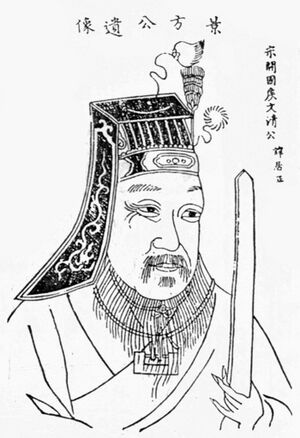Xue Juzheng facts for kids
Quick facts for kids
Xue Juzheng
|
|
|---|---|
| 薛居正 | |

from an 18th-century genealogy book
|
|
| Chief minister of the Song dynasty | |
| In office October 17, 973 – July 12, 981 Serving with Shen Lun, Lu Duoxun
|
|
| Monarch | Emperor Taizu, Emperor Taizong |
| Personal details | |
| Born | c. 912 Xunyi County, Kaifeng, Later Liang |
| Died | July 12, 981 (aged 68–69) Kaifeng, Song Empire |
| Children | Xue Weiji (薛惟吉), adopted son |
| Parent |
|
| Xue Juzheng | |||||||||
|---|---|---|---|---|---|---|---|---|---|
| Chinese | 薛居正 | ||||||||
|
|||||||||
| Xue Ziping | |||||||||
| Chinese | 薛子平 | ||||||||
|
|||||||||
Xue Juzheng (born around 912 – died July 12, 981) was an important government official in ancient China. His courtesy name was Ziping. He worked for several different ruling families, or dynasties, during a time of change in China. These included the Later Jin, Later Han, Later Zhou, and finally the Song dynasty.
Xue Juzheng became one of the most important officials, known as a chief minister, for the Song dynasty. He held this high position from 973 until he passed away. Today, he is most famous for leading the creation of a huge history book called Old History of the Five Dynasties, which was finished in 974.
Contents
Life During the Five Dynasties Period
Xue Juzheng was born during the time of the Later Liang dynasty. People said he loved to study and had big goals from a young age. In 934, when the Later Tang dynasty was in power, Xue tried to pass a special test to become a government official. He didn't pass that year.
After failing, he wrote an essay called "An Essay to Dispel Sorrows." Many people thought his essay was very good. He tried the test again the next year and passed! This meant he could start working for the government.
Early Career and Helping Others
After the Later Jin dynasty took over in 937, Xue Juzheng worked for a military leader named Liu Suining. Later, in 941, he got a job checking on the Salt Monopoly. This was a government system that controlled all the salt.
In 944, he worked as a judge. He also worked for the person in charge of the Salt Monopoly, Li Song. Xue Juzheng then got a job in a court that reviewed legal cases. He also became an official who gave advice to the emperor.
During the Later Han dynasty, Xue Juzheng showed he cared about fairness. He once saved an ordinary person from being put to death. This person was accused of breaking salt laws. But Xue Juzheng didn't think the evidence was strong enough. He asked more questions and found out that the person who accused the man was lying. The accuser finally admitted to making false claims.
When the Later Zhou dynasty started in 951, Xue Juzheng was given another important role. He became a vice director in a government office that reviewed financial matters. He also oversaw all the judges in the State Finance Commission.
Serving the Song Dynasty
In 960, the Song dynasty began. It replaced the Later Zhou dynasty as the rulers of northern China. Xue Juzheng continued to serve the new Song rulers, just as he had served the dynasties before them.
During the first 20 years of the Song dynasty, Xue Juzheng worked on a very important project. He began putting together a history of the Five Dynasties period. This was the time right before the Song dynasty.
Writing the Five Dynasties History
The history book was called Five Dynasties History. Its main goal was to show that the Song dynasty had the right to rule. In ancient China, people believed in something called the "Mandate of Heaven." This idea said that heaven gave the right to rule to a fair and good emperor. The book helped explain how the Song dynasty inherited this right from the Tang dynasty through the Five Dynasties.
Death and Lasting Impact
Xue Juzheng did not live long after his big history book was finished in 974. He passed away in 981. However, his work had a lasting impact. He set an example for future historians in China.
Later, other dynasties would also write histories of earlier times. They did this to help show that their own rule was rightful and important. For example, the Yuan dynasty later wrote the History of Liao for a similar reason.
 | James B. Knighten |
 | Azellia White |
 | Willa Brown |

